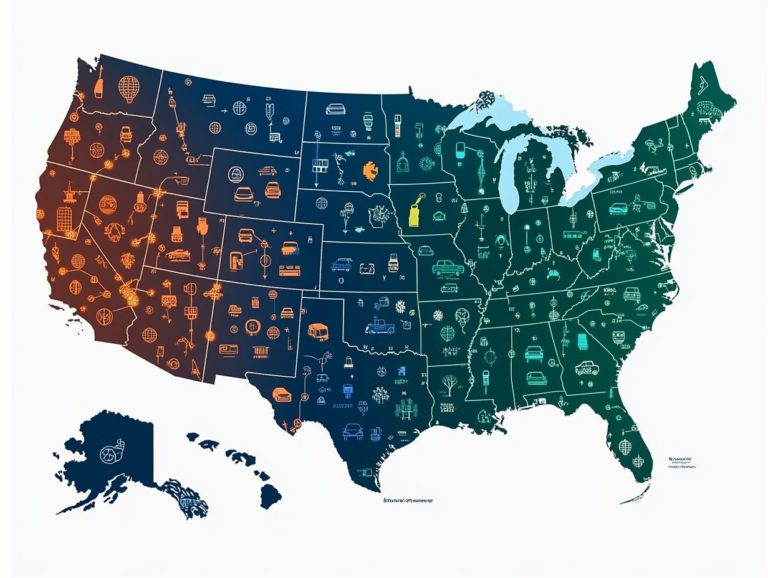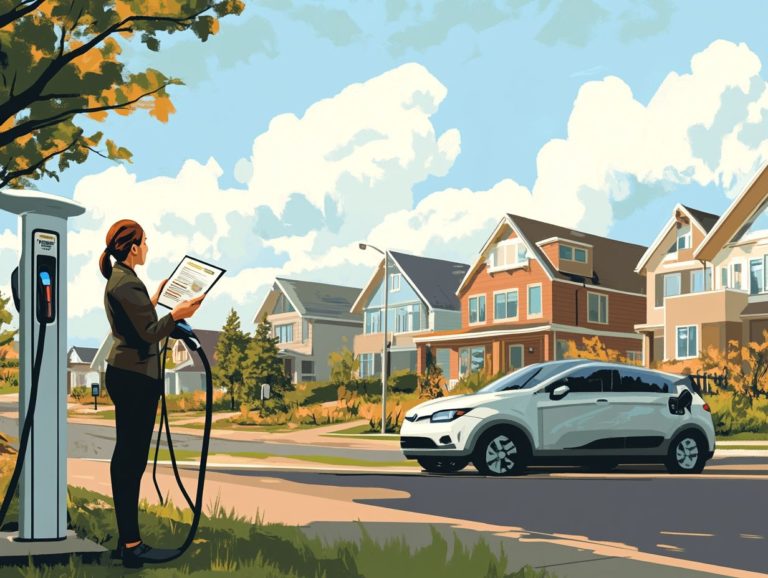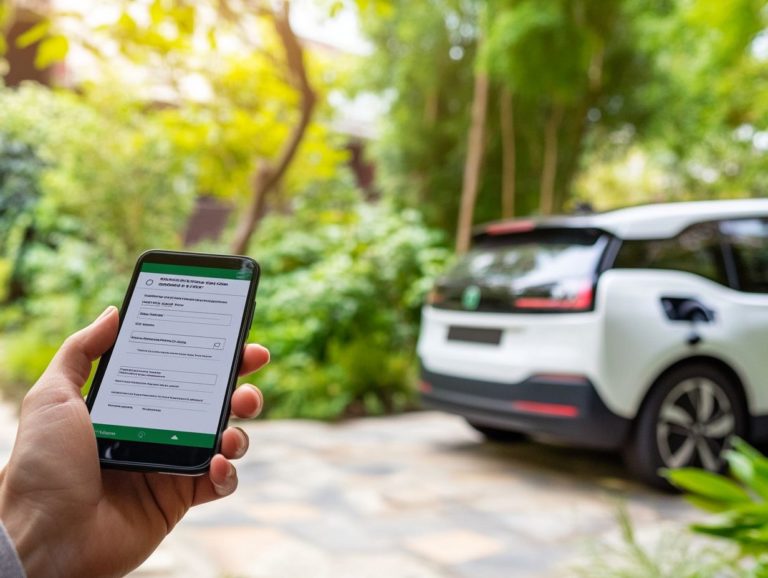understanding federal ev tax credits for 2024
Electric vehicles (EVs) are becoming popular. Knowing about federal tax credits is essential for prospective buyers like you.
This overview clarifies federal EV tax credits. It explains what they are and how you can qualify.
You will learn how to claim these credits. Plus, discover important changes coming in 2024 and other incentives you can access.
If you’re thinking about buying an EV or just want to know about the financial benefits, this guide gives you the key information.
Contents
- Key Takeaways:
- Overview of Federal EV Tax Credits
- Eligibility for Federal EV Tax Credits
- How to Claim Federal EV Tax Credits
- Changes to Federal EV Tax Credits in 2024
- Other Incentives for Electric Vehicle Owners
- Frequently Asked Questions
- What Are Federal EV Tax Credits?
- When Will the Federal EV Tax Credits for 2024 Be Available?
- Who Is Eligible for Federal EV Tax Credits for 2024?
- How Much Can I Save with Federal EV Tax Credits for 2024?
- What Is the Deadline to Claim Federal EV Tax Credits for 2024?
- Are There Any Income Limitations for Federal EV Tax Credits for 2024?
Key Takeaways:

Federal EV tax credits provide financial incentives for purchasing electric vehicles, reducing the cost of ownership.
Eligibility for these tax credits depends on meeting specific requirements and restrictions, such as vehicle type and purchase date.
In 2024, changes to federal EV tax credits are expected, so stay updated to understand the process for EV rebates and seize every opportunity!
Overview of Federal EV Tax Credits
Federal EV tax credits are financial incentives crafted by the federal government to encourage your adoption of electric vehicles (EVs).
These credits primarily target consumers like you, who want to reduce their tax liability while embracing a more sustainable lifestyle.
Instituted under the Inflation Reduction Act, these credits serve to lower the cost of electric cars, enhancing their affordability for the average buyer.
In doing so, they also contribute to a cleaner transportation sector, paving the way for a more sustainable future.
Explanation of Tax Credits
Tax credits for electric vehicles are designed to lighten your tax burden, allowing you to save money while also supporting a more sustainable future.
These incentives act as a financial shield, making it easier for you to choose greener transportation options.
The amount of credit you can receive generally depends on several key factors, including the vehicle’s battery capacity and its manufacturer’s suggested retail price (MSRP).
Larger battery capacities often yield higher credits, provided the EV meets IRS guidelines.
By grasping these calculations, you can accurately gauge your eligibility and the potential savings awaiting you, empowering your purchasing decisions.
Eligibility for Federal EV Tax Credits
To qualify for federal EV tax credits, you must meet specific criteria, including the type of vehicle, your adjusted income, and compliance with the MSRP limits established by the federal government.
Requirements and Restrictions

Federal EV tax credits have specific requirements. You need to check vehicle type, charging options, and income limits.
To qualify for rebates, newer EVs must meet specific battery capacity thresholds, reflecting the growing emphasis on energy efficiency.
For example, vehicles equipped with larger batteries can unlock higher credit amounts, making them particularly appealing for environmentally conscious buyers like yourself.
Used electric vehicles also enjoy certain incentives, though the eligibility criteria and rebate levels differ.
Commercial vehicles come with their own set of restrictions, limiting the types of businesses that can take advantage of these credits.
This highlights the necessity of understanding your income level, as it directly impacts both your access to rebates and the amounts you could receive.
How to Claim Federal EV Tax Credits
Claiming federal EV tax credits is straightforward but requires attention to detail.
You ll need to navigate through the necessary paperwork and adhere closely to IRS guidelines to ensure that your eligible vehicles receive their rightful credit when it s time to file your tax return.
Step-by-Step Process
The step-by-step journey to claiming EV tax credits begins with you verifying your vehicle’s eligibility. Start by ensuring that the make and model you ve chosen qualifies for the credits. Gather the necessary documentation, such as purchase agreements from the dealership.
This initial verification is crucial. Not every vehicle qualifies for these incentives. After confirming eligibility, organize your paperwork carefully. This means keeping all documents in order, including purchase contracts, the vehicle identification number (VIN), and any relevant federal and state tax forms.
Thorough preparation can impact your tax liability and rebate amounts. This will help you maximize your benefits.
Once you have all the required information at your fingertips, the next vital step is filling out IRS Form 8834, which details the tax credit. This ensures accurate reporting on your annual tax return, setting you up to reap the rewards of your careful planning.
Changes to Federal EV Tax Credits in 2024
The anticipated changes to federal EV tax credits in 2024 are set to make waves in the electric vehicle market, and understanding what you need to know about EV tax policy will be crucial for consumers.
You can expect the federal government to introduce new regulations that could reshape eligibility criteria and rebate amounts. This shift will likely influence your decisions as a consumer in the evolving landscape of electric vehicles.
Updates and Predictions

Predictions for updates to federal EV tax credits indicate a shift toward income limits and sourcing requirements for critical minerals used in battery production. This reflects the increasing emphasis on sustainability within the auto industry.
These changes could dramatically reshape how manufacturers operate and where they source materials. Get ready for an exciting shift!
Tighter regulations on lithium and cobalt sourcing may prompt automakers to reevaluate their supply chains, potentially favoring domestic resources or exploring alternative materials to meet production demands.
This could affect costs and impact the overall availability of electric vehicles in the market. As manufacturers adapt to these new regulations, you may discover a wider array of options available.
You might have to navigate fluctuating prices and changes in vehicle features to meet the latest sustainability standards.
Other Incentives for Electric Vehicle Owners
In addition to federal tax credits, you can take advantage of a range of state and local incentives designed to encourage electric vehicle adoption.
These incentives not only enhance your savings but also play a significant role in reducing your environmental footprint.
State and Local Incentives
State and local incentives for electric vehicles can vary significantly. Many offer enticing rebates, tax credits, and support for charging infrastructure designed to facilitate your shift to cleaner transportation.
Take California, for example. It boasts a robust suite of incentives, including generous rebates available through the Clean Vehicle Rebate Project (CVRP). These can substantially reduce the purchase price of eligible electric vehicles.
Local utility companies in California often sweeten the deal by offering their own perks, such as discounted rates for charging during off-peak hours. When combined with dealership offers, these state-sponsored programs create an appealing financial landscape for you as a prospective buyer, making electric vehicles not only a green choice but also a smart economic decision.
Other states are following suit, developing similar models to support a smoother transition toward sustainable transportation alternatives.
Manufacturer Incentives
Manufacturers often roll out enticing incentives for Electric Vehicles (EVs), including rebates and special deals that can significantly lower your overall costs while boosting the environmental benefits of switching to electric.
These incentives can be quite diverse. They range from upfront cash rebates that reduce the purchase price to financing options featuring lower interest rates. This makes EVs more accessible to a wider audience.
For many, promotional rebates can be the deciding factor between owning a cutting-edge electric vehicle and settling for a traditional gasoline-powered model. Special financing offers let you spread out payments over time, further enhancing the appeal of transitioning to electric.
Ultimately, these incentives are more than just clever marketing strategies. They play a pivotal role in shaping purchasing decisions and hastening the movement toward sustainable transportation.
Frequently Asked Questions

What Are Federal EV Tax Credits?
Federal EV tax credits are financial incentives provided by the US government to encourage the purchase of Electric Vehicles (EVs). These credits can reduce the overall cost of an EV for consumers, making them more affordable and accessible.
When Will the Federal EV Tax Credits for 2024 Be Available?
The federal EV tax credits for 2024 will be available starting January 1st, 2024. However, the exact amount of credit and eligibility criteria may vary depending on the government’s final decisions, so it’s important to understand what you should know about EV tax credits.
Who Is Eligible for Federal EV Tax Credits for 2024?
Individuals purchasing a new EV for personal use may be eligible for federal EV tax credits. Businesses and organizations may also qualify if they purchase EVs for their fleet or company use. However, eligibility criteria may differ based on the type of EV and the manufacturer.
How Much Can I Save with Federal EV Tax Credits for 2024?
The amount of federal EV tax credits for 2024 can vary depending on the type of EV and the manufacturer. Generally, these credits can range from $2,500 to $7,500. For more insights, check out understanding the tax benefits for EV owners. However, this amount may change based on government decisions and the availability of funds.
What Is the Deadline to Claim Federal EV Tax Credits for 2024?
The deadline to claim federal EV tax credits for 2024 is December 31st, 2024. This means that the EV must be purchased and delivered by this date to be eligible for the tax credit. To maximize your benefits, consider understanding tax deductions for EV purchases, as it’s important to note that the government may adjust the deadline based on funding availability.
Are There Any Income Limitations for Federal EV Tax Credits for 2024?
No, there are no income limitations for federal EV tax credits for 2024. However, some states may have their own income limits for EV tax credits, so it’s important to check with your state’s regulations. Additionally, the tax credit amount may be reduced or eliminated for high-income taxpayers.






